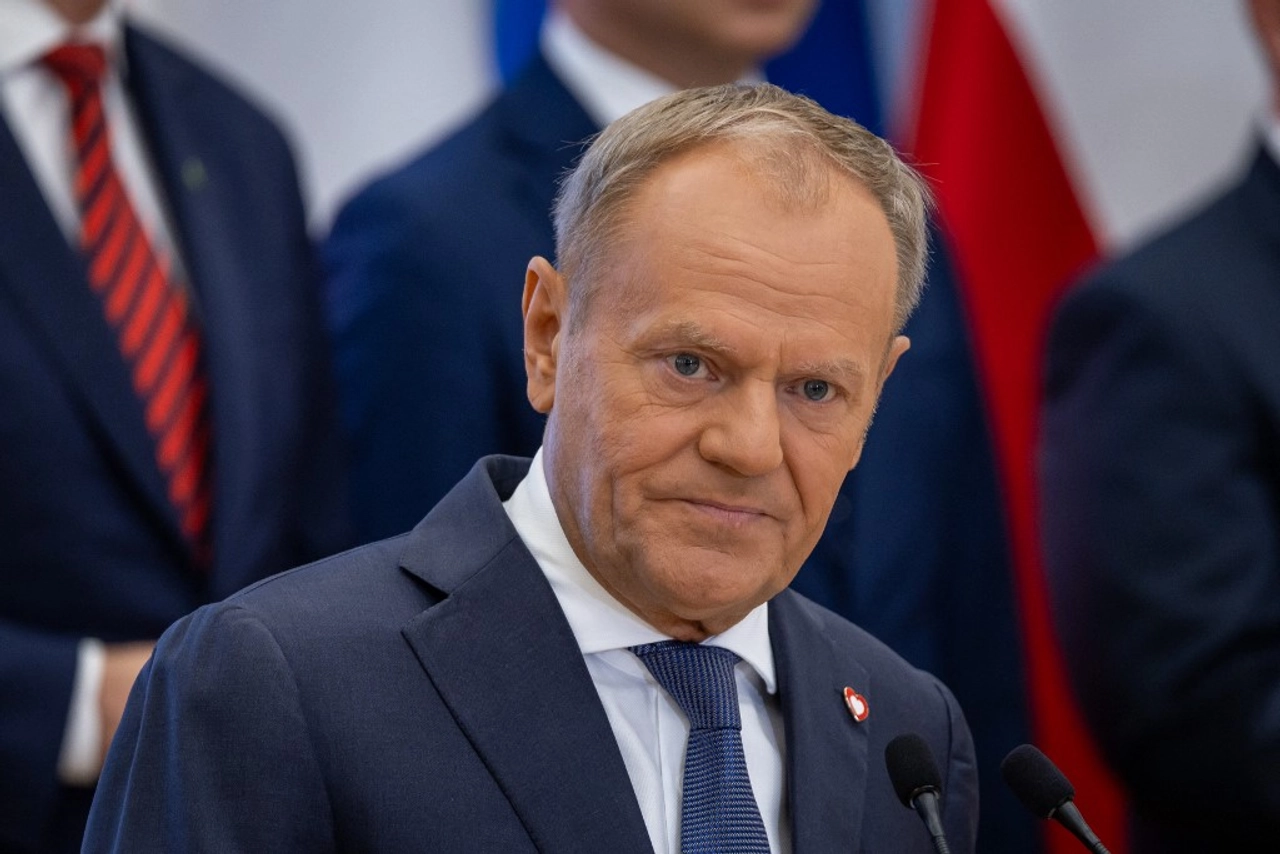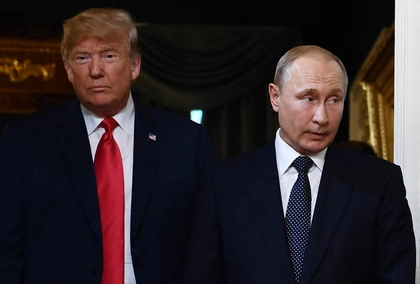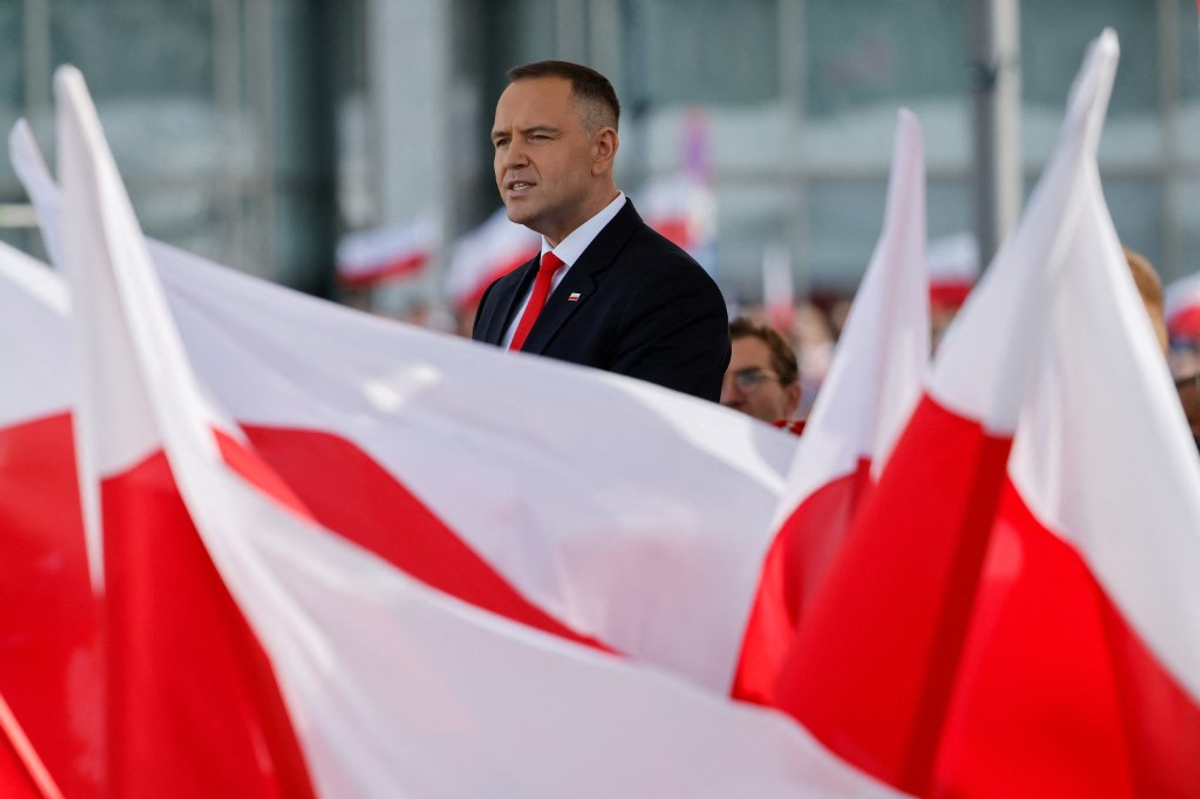Poland’s new president, Karol Nawrocki, unexpectedly joined a call with US President Donald Trump and other European leaders on Wednesday in place of Prime Minister Donald Tusk, highlighting his emerging influence with Washington.
Tusk told reporters in Warsaw that the US side informed him “shortly before midnight” on Tuesday that they “would prefer” Nawrocki to represent Poland on the Ukraine-focused call.
Follow our coverage of the war on the @Kyivpost_official.
 Poland’s Prime Minister Donald Tusk speaks during a press conference announcing changes in his government in Warsaw, Poland, July 23, 2025. (Photo by Wojtek RADWANSKI / AFP)
Poland’s Prime Minister Donald Tusk speaks during a press conference announcing changes in his government in Warsaw, Poland, July 23, 2025. (Photo by Wojtek RADWANSKI / AFP)
The meeting was meant to present a unified European stance ahead of Trump’s planned summit with Russian President Vladimir Putin in Alaska on Friday to discuss the war in Ukraine.
The absence of Poland’s veteran, pro-EU prime minister was striking – particularly as Tusk had earlier participated in a video conference with European leaders that same day to prepare for the Trump call, according to Bloomberg.
Previously an amateur boxer, Nawrocki scored a surprise victory for the opposition party in June’s presidential election – despite his lack of political experience – dealing a blow to Tusk’s government.

Other Topics of Interest
Trump vs Putin in Alaska: Face Down the Monster or Feed Him
Americans know Putin is a monster, and they know a partnership with Ukraine can stop that monster. History will remember whether Trump stood up to him or cowered.
During the campaign, he received a boost from Trump allies – including Homeland Security Secretary Kristi Noem – and met briefly with Trump in the Oval Office.
Speaking at the first-ever CPAC event in Poland in May, Noem urged voters to support Nawrocki, declaring, “He needs to be the next president of Poland, do you understand me?” as reported by ABC.
Nawrocki also met briefly with Trump in the Oval Office in May, further signaling his alignment with Trump and US conservatives.
Trump praised Nawrocki’s “GREAT WIN” on social media ahead of his inauguration this month, saying it was because “he truly loves the Polish people.” The US president has invited him to the White House for a working meeting on Sept. 3, according to Politico.
Trump’s relations with Poland have long intersected with its internal political divides.
During his first term, Trump built close ties with the nationalist Law and Justice (PiS) party, then in power, which shared his hardline approach to immigration and skepticism toward Brussels.
His visits to Warsaw, including a high-profile 2017 speech in Krasiński Square, were warmly received by PiS leaders, who saw him as a counterbalance to EU pressure on rule-of-law issues.
By contrast, Tusk – a former European Council president and leader of the pro-EU Civic Platform – has had a cooler relationship with Trump. While both support Ukraine’s defense, Tusk’s alignment with EU consensus politics and criticism of Trump’s foreign policy style have put him on the opposite side of Warsaw’s political fault lines.
“The American side has promised that it will consult with European partners on its position before the meeting in Alaska,” Tusk said at a news conference on Monday.
“I will wait… for the effects of the meeting between Presidents Trump and Putin – I have many fears and a lot of hope,” he added.
Under Tusk’s watch, Poland earned the title of NATO’s top spender. Trump has long demanded that Europe contribute more to the Alliance: In 2025, Poland will spend 4.7 percent of its GDP on defense, while the US defense budget is expected to slide to 2.9 percent of GDP in 2025. The US Congressional Budget office forecasts that number to dip to 2.4 percent in 2035.
(In the 2024 rankings, where the US stood in third place among members at 3.4 percent, Finland claimed seventh place at about 2.4 percent.)
Nawrocki’s emergence as Trump’s preferred interlocutor comes as PiS-aligned figures seek to rebuild influence after losing power in parliament to Tusk’s coalition last year.
His presence on the call underscores Washington’s willingness to sidestep the pro-EU Polish government in favor of a president more ideologically aligned with Trump, influencing both the domestic balance of power and Ukraine’s international support network.
